Trust 'Betrayal' for a fun, slightly random game experience
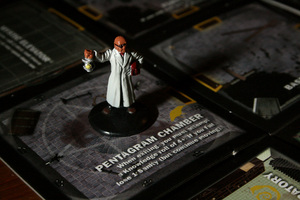
Mike Hulsebus | Contributor
Not all great board games are fun. Not all fun board games are great. While I wouldn’t say that today’s game, Betrayal at House on the Hill, is a game worthy of greatness, it certainly is a lot of fun. If you wanted to pick apart some of its design choices, you could, but regardless, I think this is the most fun new game that I’ve played in a while.
Betrayal is a game in which the players explore a haunted house until a traitor among them is revealed. Each side then reads their respective parts of one scenario — one of 50 scenarios — develops a plan and goes forward trying to accomplish their goal before the other team. Let’s look more closely at how the game plays to determine if this is a game you'll want to explore further or whether it will send you running for the exits (spoiler alert: they locked behind you).
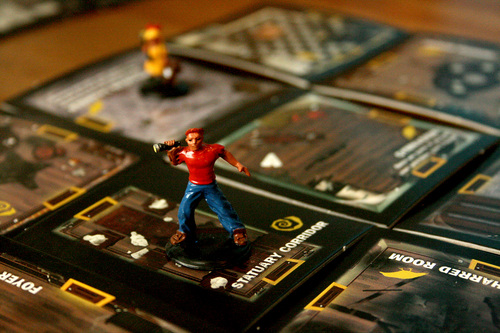
Investigators spread out during the first segment of the game game, revealing the rooms of the house one tile at a time.
Mike Hulsebus | Contributor
I’m going to gloss over the typical rules discussion this time since the rules are pretty simple. I'll say, however, that the first part of the game is mostly just setting up for the rest of the game. You’ll each send out your investigators into unexplored places of the house, things will happen and once you either draw a card or run out of movement, your turn will be done. Occasionally the rooms you discover will require rolls to escape (can you make it through the attic without falling through to the basement?) or rolls to make a discovery (can you find a way into the item vault with a knowledge check?). While you have a goal, there is no particular strategy to this part other than “get stuff, get better.”
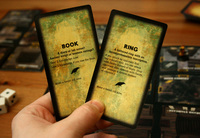
Two sample omen cards.
Mike Hulsebus | Contributor
Some of the cards that you pick up will be omen cards. Every time you draw an omen card, you will have to make a roll that could transition everyone from the setup part of the game to the haunt. Players will typically each enter the haunt with a few items, some extra bonuses and a decent amount of the house explored, but, because it comes about as part of a roll, it’s possible for it to come much sooner.
Once the haunt starts, players consult a table that checks which room the haunt revealer was in and what item it was that triggered the haunt. This is where the game springs into motion.
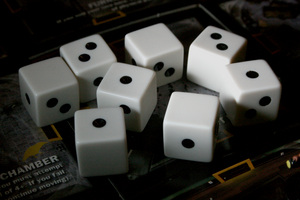
Dice in Betrayal each roll results ranging from 0 to 2.
Mike Hulsebus | Contributor
The game comes with 50 different scenarios. Once the haunt is revealed, players find out who among them is the traitor. He goes into a different [real-life] room and reads a special book that tells him what's happening in the house and how he wins the game. For example, in one scenario, I learned that I was immortal and would win by killing an investigator and taking him to one of four rooms. The heroes also get a book that tells them special rules about how they win. For example, in that scenario, they learned that they could activate a statue using an item, send him to me and that was the one way that I could be wounded. I knew there was a statue on the board and that they were somehow trying to stop me. They knew I was incredibly strong and that they had to stop me from doing something but not what. Both sides have to watch the other players' actions to figure out what the best course of action might be.
Players never know what's coming next. You don't know what cards are coming up or what's going to be in the next room that you're going to pull, and you can't completely tell what your opponent is doing to win. Shoot, you even roll dice that potentially come up with a result of zero. The game has a lot random elements that all come together in to make for an unpredictable game. There is strategy, yes, but you'll want to look elsewhere if you want anything other than a light strategy game.
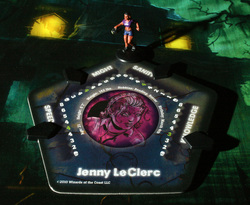
Each character has different stats depending on which side of the double-sided tile you choose.
Mike Hulsebus | Contributor
The main complaint that Betrayal’s detractors have is that the first part of the game — the part in which you’re exploring up the house — seems pointless. While it’s true that yes, you don’t have an objective other than “explore and set up the house,” I surveyed everyone that I have played it with, and all said that they either didn’t mind that or that they enjoyed that part of the game. I like the fact that the random set-up elements of the game can create a seemingly asymmetric haunt that players must strategize around. I don't need every element of a game's design to be some intricate machine of flawless game design. If occasionally this means my character gets trapped in a room with Frankenstein's monster and dies on turn one, that's fine. I know what I'm getting into.
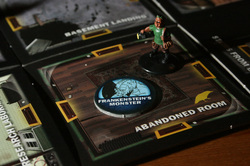
No, the child probably can't roll better than Frankenstein's monster, but he can (a spear would certainly help too).
Mike Hulsebus | Contributor
Knowing that each game that I play in will have different goals and a different feel is what makes me excited to play the game again, even if the play time varies. The game comes with all sorts of monster tokens and so far I have yet to see why in the world I might need more than 10 of some monsters when so far I've only seen a max of one monster out at a time.
This game is fun, which is one of the best reviews that I can give a game. I like games were I can work as a team with other players other players (rather than a free-for-all like many games are), and I like games where you aren't entirely sure of another player's motivations. Basically, this game is a box full of uncertainty, and that's what I like.
Mike Hulsebus will eat his words in a future glowing review of Blokus, a game that has absolutely no randomness to it to speak of. Point out his hypocrisy at mikehulsebus@gmail.com and look for other contradictions by visiting dicearenice.com .

